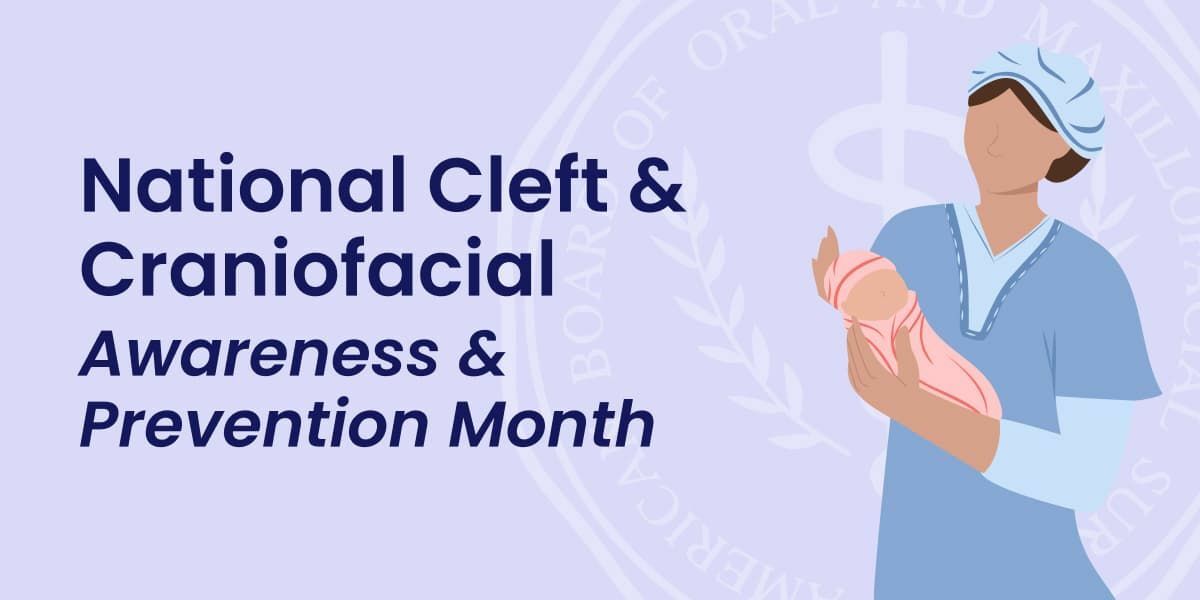
Jul 8, 2024
July is National Cleft and Craniofacial Awareness and Prevention Month, a time to celebrate the patients and surgeons whose lives have been touched by cleft and craniofacial anomalies. Several American Board of Oral and Maxillofacial Surgery (ABOMS) Diplomates are specialists who hold Certificates of Added Qualifications in Pediatric Craniomaxillofacial Surgery (Cleft and Craniofacial Surgery), dedicating as much as 50% of their practice to working with patients who are born with conditions like cleft palate and craniosynostosis.
To raise awareness about these facial anomalies, we are sharing several insights from ABOMS Diplomates who work closely with children and families undergoing treatment for cleft and craniofacial anomalies—a treatment which typically involves several surgeries, and thus fosters a close surgeon-patient relationship.
What do you wish the public understood about treatment for cleft and craniofacial anomalies?
“Cleft and craniofacial anomalies are congenital and acquired deformities of the head and face such as cleft lip and palate and craniosynostosis. Due to the complex nature of these conditions, care requires a comprehensive, multidisciplinary team approach to ensure the best outcomes for patients.”
—Joli C. Chou, DMD, MD, FACS
“Beyond performing surgery, my practice also encompasses multidisciplinary care, working with orthodontists, speech therapists, psychologists, and other specialists to ensure comprehensive care for the patient. I provide preoperative and postoperative care, including long term follow-up to ensure patients have optimal outcomes.”
—Rachel A Bishop, DDS, MD, FACS
Do cleft and craniofacial conditions coincide with cognitive impairments?
“Cleft and craniofacial anomalies, although very visible, frequently occur in patients without any neurological or cognitive sequelae. Many patients with these conditions are mistakenly believed to have other impairments when nothing could be further from the truth. Many cleft and craniofacial afflicted patients serve as a model for persistence, kindness, humility, and maturity.”
—Nicholas Mechas, DMD
What other challenges do children with cleft and craniofacial anomalies face?
“I wish the general public had a broader understanding of not just cleft and craniofacial anomalies, but what the experience is like for a child born with a facial difference. I think that people see children with cleft and craniofacial anomalies and sometimes draw their own conclusions about the child’s experience. From my experience, all of the children I care for are just like other kids, growing and navigating life. The biggest difference for these children is that they endure many surgeries early in life and there can be fatigue in that. Additionally, these children can experience anxiety regarding their facial difference, and at worst, bullying. Education is key in providing information so the public has a better understanding of these unique conditions, the struggles the families face, and the impact these conditions have on the patient.”
—Rachel A Bishop, DDS, MD, FACS
Fabio Ritto, DDS, MD shares what it is like to work with cleft and craniofacial patients, as well as the challenges his patients can face due to facial differences.
About Joli C. Chou, DMD, MD, FACS: Dr. Joli C. Chou is an Associate Professor in the Department of Oral and Maxillofacial Surgery at Thomas Jefferson University Sidney Kimmel Medical College. She is a graduate of the University of Pennsylvania School of Medicine and Tufts University School of Dental Medicine. She completed her oral and maxillofacial surgery residency training at the Hospital of the University of Pennsylvania and Children’s Hospital of Philadelphia. Subsequently, she completed a pediatric craniomaxillofacial surgery fellowship at Charleston Area Medical Center. Her clinical fields of interest include pediatric craniomaxillofacial surgery, orthognathic surgery, and obstructive sleep apnea. Her research interests include dentofacial deformities, temporomandibular joint disorders, and obstructive sleep apnea. In addition, she serves as a volunteer surgeon for Mercy Ships, performing treatment for the underserved population in Africa.
About Nicholas Mechas, DMD: Dr. Nick Mechas was born in Montreal but moved to Kentucky when he was young. He received both bachelor’s and dental degrees from the University of Louisville, graduating Magna Cum Laude. Dr. Mechas completed his Oral and Maxillofacial Surgery Residency at Temple Hospital. Next, Dr. Mechas completed a Cleft Lip, Cleft Palate, and Craniofacial Surgery Fellowship in Oklahoma. He is a full-time faculty and associate professor at the University of Tennessee College of Dentistry. Dr. Mechas serves on the membership committee for the ACPA.
About Rachel A. Bishop, DDS, MD, FACS: Dr. Rachel A. Bishop specializes in cleft and craniofacial surgery at Shriners Children’s Shreveport. She received her undergraduate degree in biology from Texas A&M University. She attended dental school at The University of Texas School of Dentistry in Houston, where she was inducted into the national dental honor society, Omicron Kappa Upsilon. Dr. Bishop obtained her medical degree from The University of Texas School of Medicine (McGovern Medical) in Houston, and was inducted into the Alpha Omega Alpha national medical honor society. She completed two years of training in general surgery and an oral and maxillofacial surgery residency at The University of Texas Health Science Center in Houston. Dr. Bishop’s passion for treating patients with facial differences led her to pursue specialized fellowship training in pediatric cleft and craniofacial surgery at Louisiana State University Health Sciences Center.
About Fabio Ritto, DDS, MD: Dr. Ritto earned his dental degree at Rio de Janeiro State University where he also completed a Residency training and a Master’s Degree in Oral and Maxillofacial surgery. His Medical Degree was earned at Estacio de Sa University and his PhD at Campinas State University (UNICAMP), with a focus on Maxillofacial and Orthognathic Surgery. He completed a Fellowship in Cleft and Craniofacial Surgery at Oklahoma University and was trained by Dr. Kevin Smith and Dr. Paul Tiwana. For approximately 10 years Dr. Ritto was an Assistant Professor and Program Director in the Surgical Specialties Department at Pedro Ernesto University Hospital in Rio de Janeiro, Brazil. He is now the OMS Residency and Cleft and Craniofacial Fellowship Director at the University of Oklahoma. He has authored several scientific articles and textbook chapters in Oral and Maxillofacial Surgery.